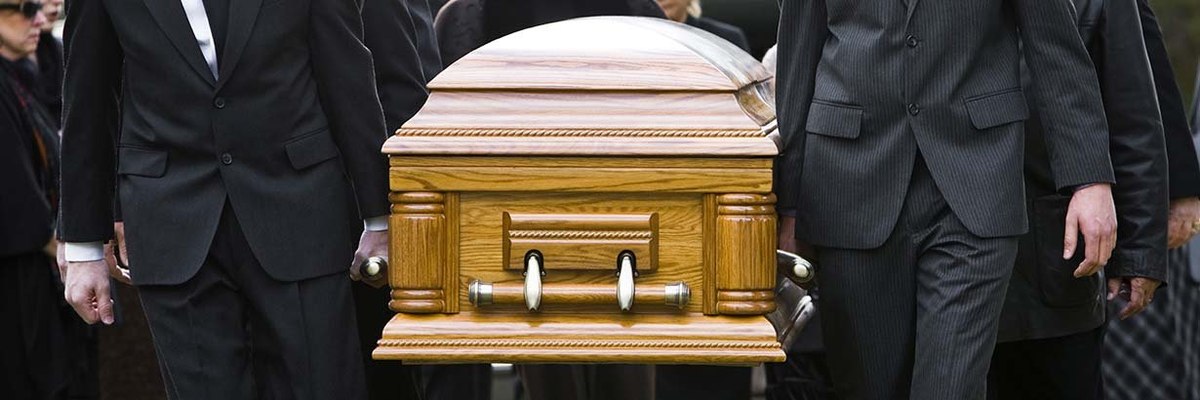This may be the first time in all the years I’ve been writing this column that I have begun by stating my own view on my chosen subject. Then again, it’s also the first column in which I have addressed the question of my own death. Or, to be more precise, my own funeral. And that’s because a survey by the religious think tank Theos has just found that most of us don’t want one. Do You?
Maybe I should be a little more precise. What do we mean by a “funeral”. At the risk of stating the obvious, we’re all going to die and something must be done to deal with our remains. I want mine to be buried in a cardboard coffin in the small woodland I own in west Wales. I rather hope my children and grandchildren will be there and that my son will play a little Bach on his cello and my daughter will read a poem. There will be no religious element whatsoever.
Does that really qualify as a funeral? Not if you accept the views of Justin Welby, the Archbishop of Canterbury, it doesn’t. He is deeply concerned that people “are not just becoming increasingly distanced from the traditional means of comfort and hope offered by the Christian funeral”. Many, he says, don't want any sort of funeral at all because most of us now regard them as “expensive, time-consuming and irrelevant”. Welby thinks that is “shocking” because it suggests a future “in which death is increasingly taboo and grief shameful”. Can that really be true?
It’s certainly true that cost plays a large part in our growing reluctance to go down the traditional route. The bill for even the most modest adds up to an average of £5,500. Rather less than the average wedding, which is three times as costly, but still significant. Fewer than half of those who responded to the survey wanted any sort of religious service or ceremony.
There has been a pretty dramatic increase in the number of so-called “direct cremations”, which means there is no funeral service or ceremony beforehand and, in many cases, no mourners. The most basic “packages” are bought online. The company picks up the body, disposes of it at the crematorium and the nearest relatives are sent a package of ashes through the post. Rough cost: £1,500.
Madeleine Pennington and Nathan Mladin of Theos, the study's authors, describe it as death often taking place behind closed doors, creating a society that keeps it “at arm's length”.
The author and television producer Daisy Goodwin is one of many who have reacted with dismay to the Theos survey. She described in the Mail the funeral of her own mother ten years ago. She had not, said Goodwin, been a good mother in the conventional sense.
“When we were little,” she wrote, “she left my father, a film producer, to run off with a novelist eight years her junior”. She saw her only every other weekend and in the holidays but never lived with her and when she had her own children, she “found it hard to forgive her for what she had done. It took me years to reconcile the mother I had adored with the woman who had bolted.”
And yet, she wrote, her funeral service was cathartic: “It wasn't until I heard Purcell's music at her funeral that I understood my life-enhancing, maddening, perennially-youthful mother was actually dead… It brought everything I felt about her to the surface and for the first time since her death ten days earlier, I was able to acknowledge my grief. For me, my brother and younger half-sisters, that funeral provided the crucial emotional framework that kept us sane in the first shock of her death.”
Goodwin contrasts the modern attitude towards funerals with what it was like a couple of generations ago when families were bigger, life expectancy shorter and people took pride in joining mutual insurance schemes to provide for their own funeral costs or to send their loved ones off in style.
Now, she says, the idea of planning your own funeral seems morbid. It doesn't “fit into our shiny, happy lives”. She laments that she doesn’t “see many funerals on Instagram with uplifting hashtags attached.”
So what about those ceremonies that have replaced the traditional funerals? Goodwin went to one of them in a crematorium for a friend’s mother recently. She described it as a “non-funeral… a stripped-back affair. Just a few words from the children and Frank Sinatra as the coffin went into the furnace… There was also no cathartic moment, no rush of emotion, no sense of taking part in this most meaningful of human rituals. And no point therefore at which it was possible to let go.”
Goodwin coined an interesting phrase to describe what the Theos survey has revealed. Funeral denial. It is, she believes, ultimately a selfish act: a reflection of just how narcissistic we have become: “Funerals aren't events for the one who has died, after all. They're for the living… if we don't contemplate the end that lies in store for all of us at a funeral, then I believe we are missing an opportunity to savour the meaning of the life we have left.”
Many commentators have made the point this week that Roman emperors had a slave standing behind them in their carriage after a triumphant battle as the crowds roared their approval. His job was to speak quietly in the emperor’s ear: “Remember, Sire, you are mortal.”
In Goodwin’s words: “Our modern reluctance to have funerals is connected to a profound squeamishness about death, but are we doing ourselves any favours by pretending we are not all headed in the same direction?”
Alice Thomson announced in The Times that she occasionally plans her own funeral and she’s very clear about what she doesn’t want: “I would find a grave claustrophobic and, although I have watched a Tibetan sky burial, I’m not sure I want my bones picked over by crows. A cardboard coffin would be perfect: anyone can write on it before it goes up in flames. And there would be a memorial celebration afterwards.”
So that’s easy then. She’s even decided what she wants to happen to her body once her organs have been donated: “Scattered in my favourite places at home and around the world rather than ending up in some burial plot that might one day be concreted into a car park. My children could smuggle my remains through airports so I could still go on the occasional holiday with them. My husband might join me. My father, who died a year ago, had his ashes mixed with my mother’s in a teapot along with our childhood dogs, which we scattered in the Thames on a snowy day before a traditional church service.”
Perhaps the biggest question prompted by the Theos survey is whether we are being selfish or unselfish if we are amongst the minority who positively want a funeral ceremony of some sort.
According to the Hospice UK Dying Matters campaign, 80 per cent of people said they had never discussed the subject openly. That includes even those who have been diagnosed with a terminal illness. Only six per cent said it had nudged them to talk about dying. Fifty per cent of all couples never ask their partner about their end-of-life wishes.
Funerals may be wasted on the dead, says Thomson, but they can be deeply cathartic for the living, helping to process their loss. Therapy has its place but shared grief and mutual support can be very powerful. Organising a funeral can be overwhelming for those already feeling vulnerable and bereft. The bureaucracy of death is gruelling. It’s painful going through bills, cancelling direct debits or compiling guest lists for a family member when you are mourning. The kindest final gift may be to organise your own death in advance.
Goodwin believes that, just as we write a will to make our descendants' lives easier when the time comes, so we must tell them to hold a funeral for us. Tell them it's the best way to confront that maelstrom of emotion, to give the end of a life its proper significance”.
Are you persuaded by that argument? Do you give much thought to your own death. Or indeed any? And if so, do you want a funeral?
Do let us know.
Photo: Getty












